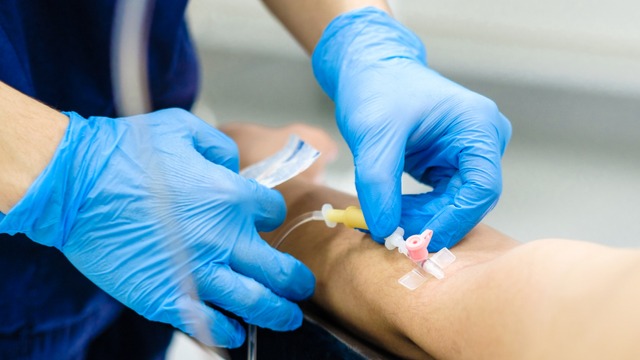Pain Medicine
The Pain Management Team is a division of the Department of Anaesthesia and Intensive Care of the Prince of Wales Hospital. The service is integrated with other pain services in the NTEC.
The Pain team members consist of specialist pain nurses and anaesthesiologists subspecialized in pain medicine. Anaesthesiologists were one of the first doctors to treat pain in Hong Kong. They also helped found an international organization called the International Association for the Study of Pain (IASP) dedicated to pain research and treatment.
The Pain Medicine Section of the Department of Anaesthesia and Intensive Care provides diagnostic and therapeutic management for various chronic intractable pain conditions, including cancer pain, acute post-traumatic and post -operative pain conditions.

I. Acute Pain Service (APS)
Provides:
- Education for patients, clinical staff and medical students
- Initiation and supervision of more advanced analgesic techniques e.g. IV PCA
- Improveed analgesic treatments
- Standardization of equipment, standing orders, guidelines and protocols
- a 24-hr pain service
- Collaboration and communication with other medical staff
- Audits of pain services
- Research
The acute pain round:
Every day, patients receiving advanced analgesic techniques like IV PCA or regional analgesia are reviewed during acute pain round.
II. Chronic Pain
Chronic pain services are provided through in-patient consultations and multidisciplinary outpatient services, in collaboration with Oncologists and Neurosurgeons.
- Outpatient services:
a) Combined Oncology Pain Clinic
We see patients at the Combined Oncology Pain Clinic with oncologist every Monday afternoon at the Li Ka Shing Outpatient Department in Prince of Wales Hospital. With a multidisciplinary approach, we focus on managing cancer pain patients with pharmacological and interventional approach.
For intractable cancer pain not responsive to traditional pharmacological approach, more advanced methods of delivery such as intrathecal pump and various nerve blocks, e.g. neurolytic celiac plexus block, would provide satisfactory pain relief. Optimization of pain control can improve quality of life in cancer patients.
b. Combined Neurosurgery Pain Clinic
We assess patients at Combined Neurosurgery Pain Clinic at Li Ka Shing Outpatient Department in Prince of Wales Hospital together with neurosurgeons on alternate Fridays.
Most patients presenting to this clinic suffer from chronic post-trauma, post-surgical and various neuropathic pain conditions. Apart from medication prescriptions and education on pain coping, interventions for pain relief ranging from intrathecal pump implantation, spinal cord stimulation and radiofrequency lesioning are provided.
c. Pain Clinic (PC1)
Pain Clinic (PC1) at the Multidisciplinary Pain Management Centre (PMC) is at the Alice Ho Miu Ling Nethersole Hospital (AHNH).
Patients referred from various specialties are assessed by pain specialists every Tuesday. Some patients are seen at the Multidisciplinary Pain Clinic jointly by pain specialists, clinical psychologists, physiotherapists, occupational therapists and pain nurses.
d. Comprehensive Out-patient Engagement (COPE)
Comprehensive Out-patient Engagement (COPE) is a multidisciplinary, cognitive behavioural therapy program. It is designed to empower patients with chronic pain to better manage their symptoms & their daily activities. It is held at the Multidisciplinary Pain Centre at Alice Ho Miu Ling Nethersole Hospital.
Picture: COPE program participants & staff
The program consists of cognitive therapy sessions, physiotherapy sessions, occupational therapy sessions, enhancing self-management skills such as pacing, relaxation etc
- Chronic pain round for in-patients
It is conducted in morning of every Monday & Friday. Both newly referred patients from various specialties and patients requiring follow-up reviews are seen by pain specialist and pain nurse.
III. Training
Anaesthesia Pain Trainee–Training Objectives
Acute Pain
- Organization of acute pain service and role of acute pain nurse
- Pain assessment on various groups of patients
- Physiological changes secondary to pain
- Different modalities for pain control
- Pharmacology and side effects of opioid and non-opioid analgesics
- Principle of patient-controlled analgesia (IV PCA) and assessment of its efficacy
- Pharmacology and side effects of epidural/intra-thecal opioid
- Neurological assessment of epidural blockade and management of failed block
- Management of regional blockade – brachial plexus, para-vertebral and intra-pleural block
- Management of potential complications of epidural analgesia, e.g. abscess, haematoma
- Acute pain control in patients with substance abuse
- Pain control in patients with concurrent medical diseases – COAD, IHD, bleeding tendency, renal impairment
- Pain control in burns patients
- Pain control in trauma patients including multiple rib fractures
Chronic Pain
- Differentiate nociceptive pain and neuropathic pain
- Mechanism of chronic pain development and the role of NMDA receptor
- Different modalities of chronic pain management, e.g. physical therapy, psychotherapy, neuro-blockade/ ablation, spinal opioid, systemic analgesia
- Anatomy, indication, technique and complication of chemical sympathectomy, e.g. lumbar sympathectomy, stellate ganglion block, celiac plexus block.
- Principle of cancer pain management
- Principle of non-cancer neuropathic pain management, e.g. phantom limb pain (PLP), post-herpetic neuralgia (PHN), complex regional pain syndrome (CRPS), trigeminal neuralgia (TGN).
- Principle of non-cancer nociceptive pain management, e.g. myofascial pain, lower back pain, intractable angina, burns, chronic pancreatitis, PVD.
- When to refer to pain specialist and role of pain specialist.
HKCA Fellowship in Pain Medicine
There are 2 training posts of fellowship in Pain Medicine (FPM under HKCA) in the NTEC. For details, please refer to HKCA pain medicine website.
Medical student
Medical students are taught on principles of acute and chronic pain assessment and management during acute pain rounds and lectures.
Attachment:
Acute Pain Teaching Material Schedule (file:Management of acute post-operative pain & management of post-operative nausea and vomiting)
Chronic Pain Teaching Part 1 Part 2 (file: Chronic pain_1, Chronic pain_2)
Public education
Members are actively involved in public lectures to increase public awareness and understanding on pain matters
IV. CME activities
Staff
Dr. Ara Li (Head of PWH pain team cum NTEC CME coordinator)
Dr. Eric Ng Chi Wai
Ms Anne Woo
Ms Ceci Cheung
Ms Josephine Chen
Ms Tai Kwai Oi

